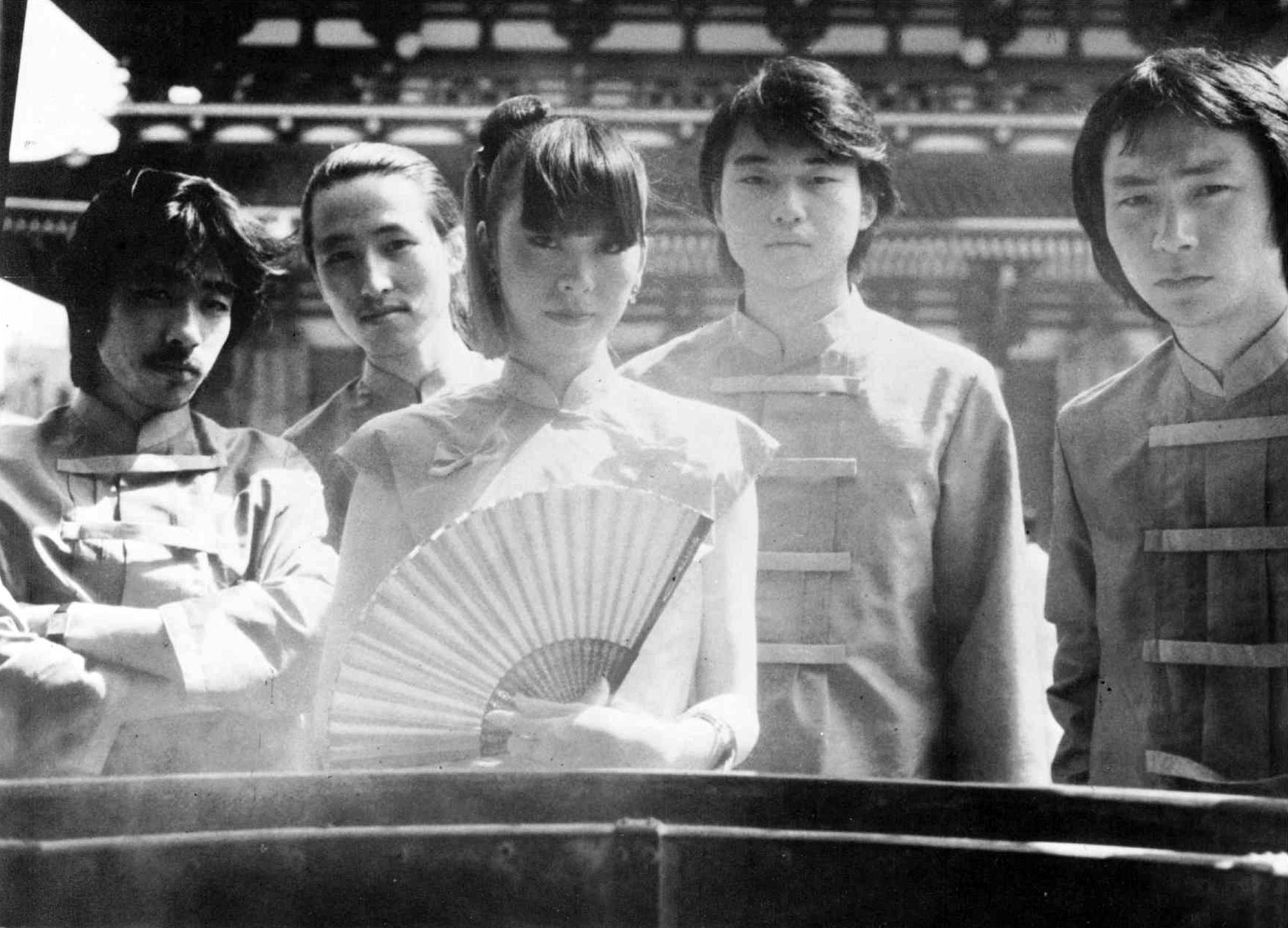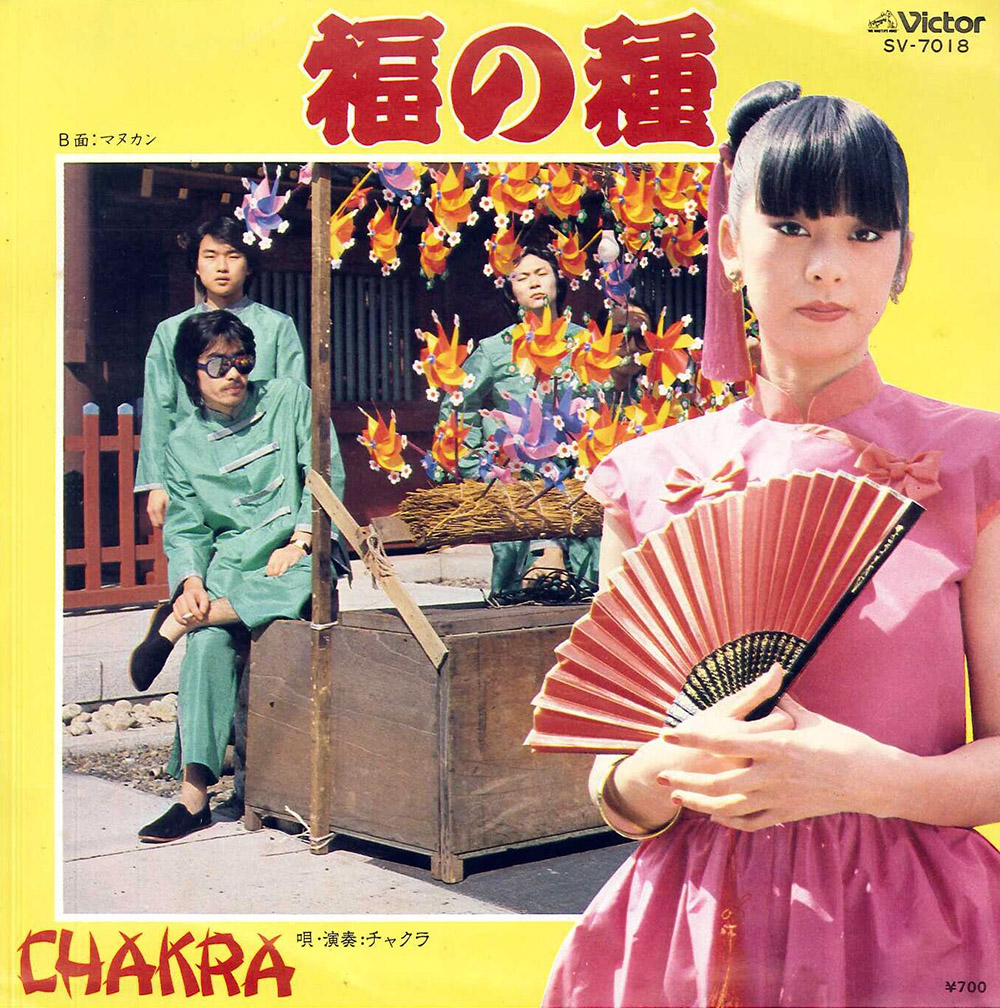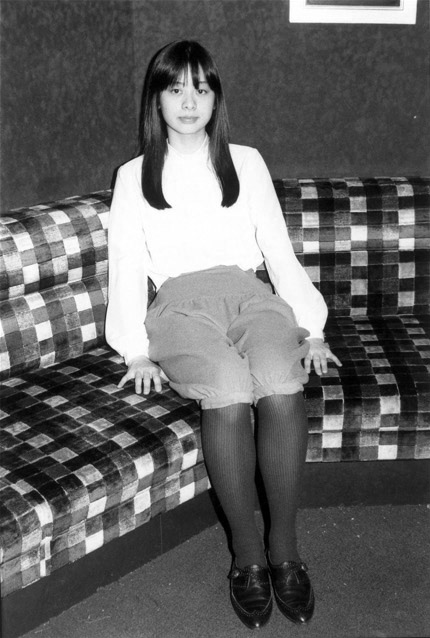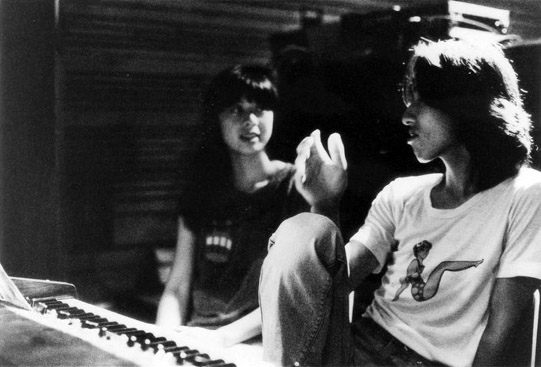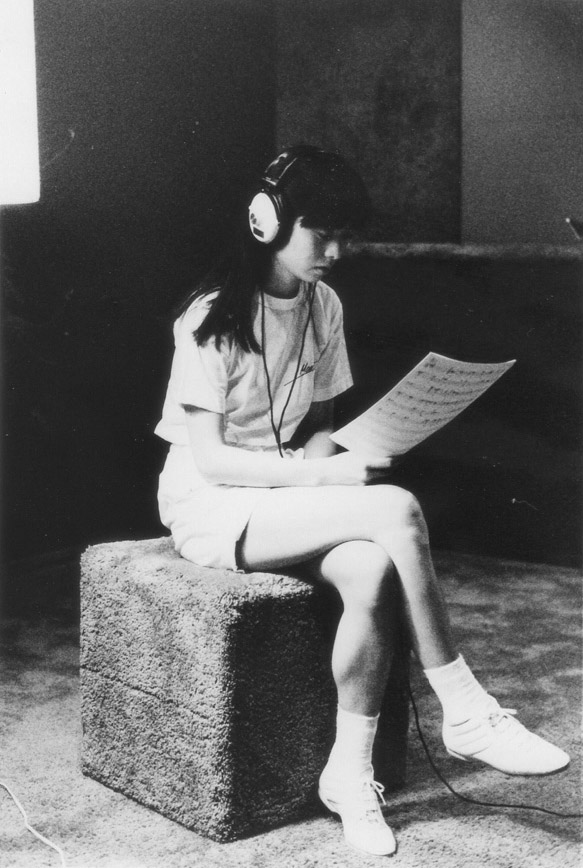This is a conversation with Ogawa Mishio, vocalist of the Japanese new wave band Chakra who were active from 1978 to 1983. Chakra is also the main topic of this discussion. Enjoy!
(Note: This is, in fact, two separate interviews compiled into one post. Thus, the questions and the order of the questions have been slightly edited to maintain the flow of the conversation.)
Interview & text: Shikata Hiroaki (Japanese text: one & two)
English translation: Henkka
Ogawa Mishio links: Website, Twitter
Note: You can buy Chakra’s music on CDJapan.
Chakra — a band of the New Wave Era who radiated a profoundly mysterious charm. Now, their albums Chakra and Satekoso have been re-released with five bonus tracks each!
In this interview, we asked the band’s vocalist Ogawa Mishio about her time in Chakra.
Birth of Chakra
— Nice to meet you, Ms. Ogawa Mishio. I was listening to Chakra in real time back when I was myself a student, so I’m very excited to be able to talk to you today. There’s so much I want to ask you, but seeing as two of Chakra’s albums, Chakra and Satekoso, have just been re-released on October 19th, I would like to focus today mainly on the Chakra days.
Chakra’s debut album was released in 1980. When and how did you first come to join the band?
Ogawa Mishio: Back in junior high school I used to tell my mom, “Mom, I’m going to be a singer.” Then, around the time I graduated from high school, I even went to audition for Tokyo Kid Brothers after seeing an advertisement in the newspaper. So maybe deep down I always had thoughts along those lines.
But then I decided that I was just going to be your average office worker instead, and so I went to business school. But after a year of that I wondered if maybe I wasn’t cut out for a corporate job after all and whether I ought to just quit—maybe singing or acting really was the way to go for me. (laughs)
Then one day I was introduced to this band who were looking for a vocalist, and I went in for an audition. I passed, and that band became Chakra. This was in the spring when I was 19 years old.
— It is difficult to imagine you working in a corporate job!
Those days were the height of techno pop and new wave, and Chakra of course were one band to emerge in the midst of that climate. Was that something you were personally conscious of? Because if you asked me, I considered Chakra to be totally their own thing.
Ogawa: Yes, maybe Chakra did kind of feel out of place. But then you could say that about all the other groups back then, too. (laughs) I’m not sure I agreed with the genre we were classified under, but I also wasn’t particularly opposed to it either. It was fun getting to meet all the other groups at events. We played a lot especially with Juicy Fruits, Hikashu, Business, and Imitation.
Chakra
1980/07/21
— “Fuku no Tane,” the first song on Chakra, is the representative Chakra song. The song was also released as a single, and it was just shocking—it’s an ondo folk song that kicks off with sound effects from a fish market! While most of the songs on the album were composed by Itakura Bun, this song alone was the work of Tomosada Kazumasa.
Listening carefully, one can even pick up on some erotic nuances in the song’s lyrics. Ah, but seeing as you’re one of the song’s lyricists… Tell us, was this a premeditated crime?!
Ogawa: No no, we were being completely sincere with them. It’s totally literal. (laughs) The lyrics are pretty proselytizing—Tomosada actually later became a Buddhist monk, you see. He’s no longer with us. He passed away. Ahh, I sure miss him. Gan-chan…
— At the time, Chakra were affiliated with Watanabe Productions. This partnership feels a little strange to me, considering the band’s musical direction. How did you personally feel about it? Also, while I didn’t witness this myself, you also appeared on the comedy TV show 8ji da yo! Zenin Shuugou, right?
Ogawa: We were initially going to be under Watanabe Publishing, and that then led us to Watanabe Productions. They had this section under them called Nonstop who I guess were pretty actively managing musicians like us. Osaka was their home base, and so they were often looking out for me. I appeared as a TV Osaka regular as Kuroda Seitaro’s assistant, and I filled in for Ann Lewis during her pregnancy, appearing on a program with Shimada Shinsuke and Matsumoto Ryusuke… I actually appeared on TV in Osaka quite a lot—people would often approach me on the street and stuff.
The 8ji da yo! Zenin Shuugou thing was… I believe we were on tour around Hokkaido and Tohoku, and we were filmed at our last show of the tour in Saitama at the Kumagaya Civic Hall, I think it was. It was a live broadcast so there was this strange sense of nervousness in the air, what with the TV staff all running around like athletes… Thinking back on it now, that was quite some PR for us.
— I recently discovered on YouTube this medley of Chakra performing “Fuku no Tane” and “Sensei” on a music TV show which also featured Yamashiro Shingo and Yoshimura Mari. While it’s a wonderful performance of “Fuku no Tane,” your cover of Mori Masako’s “Sensei” honestly blew me away. I feel like Chakra is the only band who could’ve ever come up with that kind of an interpretation of that song. Whose idea was it to cover “Sensei“?
Ogawa: There was an order from the TV show. They wanted Plastics to cover Yamaguchi Momoe, Juicy Fruits to cover Sakurada Junko, and Chakra to cover Mori Masako. Plastics turned it down though. (laughs) I think they left the song choice up to us. We chose “Sensei” which Itakura Bun then arranged.
— The second song, “Mannequin,” is just an unforgettable, curious song. In my mind, I view it similarly to middle period Beatles. I wonder if that sort of thing was what Itakura was going for? I also love your strange vocalizations. Were they ad-libbed?
Ogawa: The breadth and depth of Bun-chan’s music taste is something I struggle to work out myself, so that’s something you should definitely ask him directly. And yes, the scatting—or “strange vocalizations,” as you put it—were ad-libbed. (laughs)
— “Tokyo Suite” as a song turns Chakra into this rather mysterious entity. At 8 minutes and 22 seconds, structured into three parts, it doesn’t actually feel like it’s that long. Taste-wise it’s in the realm of progressive rock, but sound-wise it’s not just that—it’s chaos. It’s amazing how you were able to actually sing it, especially when it changes around the midpoint. Did you in fact have a hard time singing this song?
Ogawa: I had trouble trying to pronounce the few English lyrics like they were actually English. Other than that, not really. I myself actually prefer singing songs that are a bit difficult—it’s exciting. What’s difficult to sing are songs like “Mannequin.”
Satekoso
1981/11/21
— On your second album, Satekoso, there was a change in line-up as well as on the producer side as Haruomi Hosono took over for Yano Makoto. Were you aiming to go in a different direction as a band?
Ogawa: I wouldn’t say we were “aiming” to do so as much as it just happened naturally. When the band members change, so does the sound, and Bun-chan was coming up with more and more ideas, plus everyone was curious about Hosono. I think all of that had an effect…
— I know people who prefer the first album and others who prefer the second one. I personally have an emotional attachment to the first one, but I do also like the second album with all its strange, experimental songs.
The title of the second song on the album, “Myun Myun,” appears to be some kind of a mimetic word, and while there are some other lyrics as well, really for the most part it’s six minutes of you going, “myun myun myurun myuun…” Seeing as the lyrics were written by you and Itakura, how was it divided between you two?
Ogawa: Bun-chan already had the “myun myun” when he was first writing the song. The rest of the wordplay were my ideas. I asked him what he thought and we decided on them like that.
— The third song, “Ochooshimono no Koushinkyoku,” is a hyper-positive song. I feel like there is some overlap between the song and my image of you… Am I right to think so?
Ogawa: I think the lyrics actually represent Ebisu Iwashi’s philosophy. I do feel the same way though!
— Like “Myun Myun,” another equally strange song is “Itohoni,” with lyrics by Itakura. Here, you’re singing in ha-ni-ho-he-to-i-ro-ha—the old Japanese interpretation of the do-re-mi-fa-sol-la-ti-do musical scale. It’s actually quite refreshing how the lyrics thus don’t have any meaning. Was it not difficult to sing this one?
Ogawa: Sometimes I’d get tongue-tied. (laughs) And then there’s that ad-lib part at the end. On the record I wrote it down first, but doing it live it becomes even more difficult. I mean, it’s impossible to sing it before you internalize how like i = la, or sol = to.
— Having been re-listening to the album, one song that I’ve been enjoying almost as if I’d discovered it anew is “Free.” It’s amazing even to think about the fact that there was already such chaotic music out there at that point in history.
In Chakra’s case, would the songs change quite a lot throughout their creation process?
Ogawa: They would change as they got nearer to completion, sure, but I don’t think there were a lot of cases where they became completely different from what they were in the beginning.
“Free” is another one of those melodies that is difficult to sing. But I personally love that song, too.
— The last song on the original album, “Chotto Itai Kedo Suteki,” is similar to the first album’s “I Am Sourou” in how they both have this upbeat eroticism about them. You’re the sole lyricist on this one—do you enjoy writing along those lines?
Ogawa: I wonder…? Maybe it just stands out because I haven’t written many lyrics like that. Anyway, this was the punk era—you had to pepper things up a bit! (…I’m just being silly!)
Nanyo de Yoisho
1983/05/21
— On Chakra’s third and final album, Nanyo de Yoisho, you and Itakura became the only two official members of the band, and you switched labels from Victor to VAP. How did you feel about all this?
Ogawa: I just saw it as a natural progression of events.
— The album opener, “Swing (Tako ni Sasageru yo),” presents a strange world, mixing your vocals and the labyrinthine sound that only Chakra could ever produce. It’s to the point where it can no longer be neatly categorized as just “new wave.” Was a lot of it improvised by any chance?
Ogawa: No, surprisingly enough it was actually all made very methodically. (laughs)
— “Nanyo de Yoisho” is the title song of the album, and the lyrics were co-written by you and Shimoda Itsuro. That’s a rather surprising team-up you had there. How did it come to be?
Ogawa: We were introduced by our director, Fukuoka, if my memory serves me right…
— I personally love the band Films (of course, I love Chakra, too…), and the lyrics to “Hontou no Koto wo Ieba” were written by Films’ Akagi Chuji. While they aren’t actually your words, to me it still feels like they really fit your worldview. What was your connection to Akagi?
Ogawa: I don’t really remember very clearly, but it’s like we’d suddenly just become friends at some point. We would hang out a lot. It was actually Bun-chan’s idea to ask him to write the lyrics for that one.
— “Mada” is quite an unusual thing among Chakra’s discography, being a straightforward pop song. I do like the more “twisted” Chakra, but I also like the straightforward catchiness here that would lead to your later solo material. Were you consciously trying to make a more “straight ball” of a song with this one?
Ogawa: No no, as creators we never thought of it in terms of “straight balls” or “curve balls.” But yes, it might be a bit of an unusual song for us. It clearly foreshadows the end of Chakra and how we’d soon be going our separate ways.
In Closing
— Chakra left behind three albums. Was there ever an official break-up or anything of the sort?
Ogawa: Not in particular, no. Although I suppose our concert at the Aoyama Tower Hall ended up becoming that milestone.
— What with these new reissues coming out and all, please answer for the readers this final question. What was Chakra to you?
Ogawa: Chakra was my youth itself. It was the band of my destiny that led me to music, opened the doors to the spiritual world for me, and gave me a fun upbringing.
…All of which is something I am able to say only now. (laughs)
